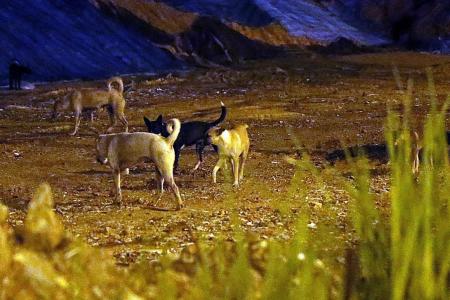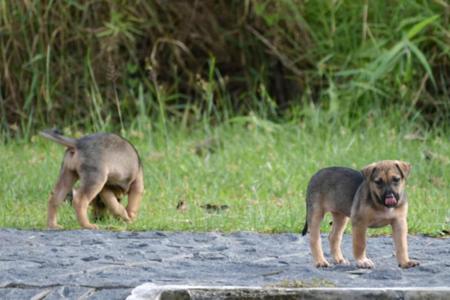AVA to introduce sterilisation programme for stray dogs
AVA to roll out five-year trap-neuter-release-manage plan to control numbers of stray dogs more humanely
The Agri-Food and Veterinary Authority (AVA) will be rolling out a five-year sterilisation programme for stray dogs later next year to manage their numbers more humanely.
The programme aims to sterilise 70 per cent of the stray dogs roaming around in Singapore.
AVA said yesterday it will work with animal welfare groups and veterinarians on the trap-neuter-release-manage programme. Efforts will also be made to re-home as many stray dogs as possible.
Dogs deemed unsuitable for re-homing will be released at chosen locations to live out the rest of their lives.
This is the first time that such a scheme for stray dogs has been rolled out at a national level. Previously, dog welfare groups, fearing that culling may be used to control the animal population, conducted such programmes on their own.
There is a national trap-neuter-release effort for stray cats, rolled out islandwide in 2014.
Stray dogs face risks from traffic, starvation and disease.
Said AVA: "Stray dogs that return to their feral instincts can potentially pose a danger to the public, especially when in packs. They are also a potential reservoir of diseases like rabies."
It estimates that there are 7,000 stray dogs here. The latest initiative aims to sterilise at least 70 per cent of them.
The AVA said a sustained sterilisation rate of 70 per cent or more is necessary to stabilise a stray dog population, before it can begin to decrease.
Mr Derrick Tan, founder of animal shelter Voices for Animals, told The Straits Times that a standard operating procedure is being worked out, which will detail the steps that should be taken after a dog is trapped. This involves procedures such as taking the dog for health checks and vaccinations.
The plan is also to get the various animal welfare groups involved in the management of certain areas after dogs are released into the environment. This will ensure that all released dogs are accounted for.
Animal welfare groups will be able to mediate any potential human-wildlife conflict that should arise.
Those who wish to participate in the programme can contact AVA at 1800-476-1600.
Minister for Social and Family Development and Second Minister for National Development Desmond Lee said in a Facebook post yesterday that many animal welfare groups already have similar programmes.
"AVA wants to take this effort further, and has been discussing with the animal welfare groups and the Singapore Veterinary Association on how to replicate the success of these localised efforts on a wider scale," he said.
"...We hope to manage Singapore's stray dog issue in a humane manner, based on science and data, and in the spirit of community partnership."
Animal welfare groups embrace AVA’s new move
Animal welfare groups, which have long called for a more humane way of dealing with stray dogs besides culling, have welcomed the new move to sterilise them.
Co-founder of animal shelter Animal Lovers League Mohan Div described the sterilisation programme as a "win-win situation".
"It allows existing dogs to live out their lives in their habitats, takes future generations of dogs off the streets where they may suffer and, overall, helps reduce the number of stray dogs in Singapore," he told The Straits Times.
Dr Jaipal Singh Gill, executive director of the Society for the Prevention of Cruelty to Animals, said the programme was "a game changer for street dogs in Singapore".
Said Dr Gill: "We are very pleased to see so many stakeholders, including the Government, animal welfare groups and veterinarians, coming together with a shared vision and approach to humanely reduce the street dog population."
Dr Siew Tuck Wah, president of animal welfare group SOSD, said various animal welfare groups have carried out sterilisation of stray dogs over the past 30 years, but there has never been a concerted, large-scale effort such as now.
"This effort also proves that our society is evolving into a more compassionate, kinder one, which cares not only for its human residents but for its animals as well," he added.
Some 11 groups have joined the programme so far. - AUDREY TAN & NG HUIWEN
Get The New Paper on your phone with the free TNP app. Download from the Apple App Store or Google Play Store now





